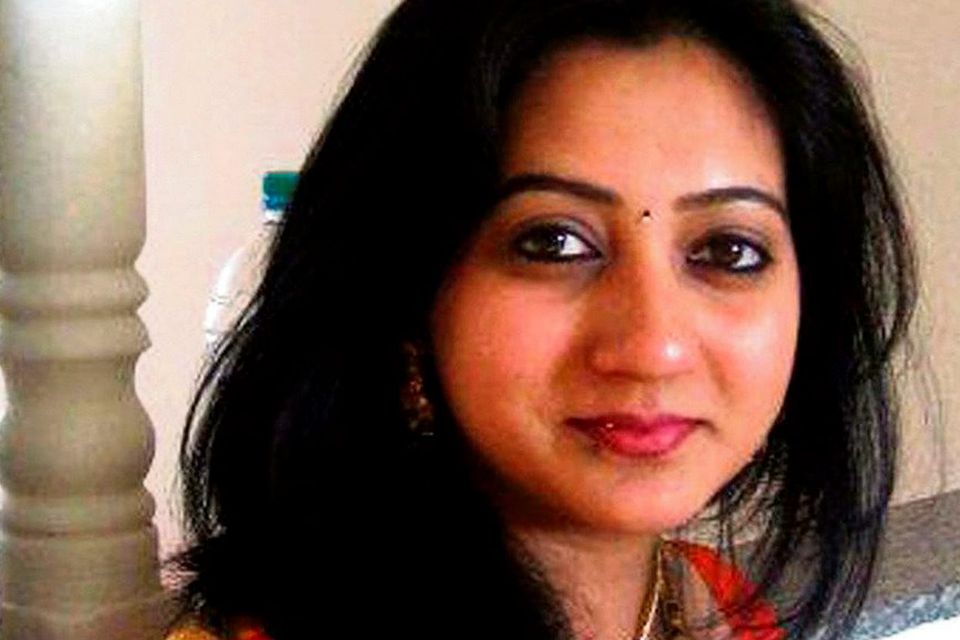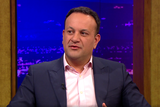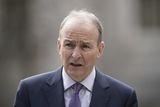Should President's wife really be commenting on sensitive political issues?
Savita Halappanavar died at Galway University Hospital in 2012 Photo: REUTERS/Irish Times/handout
The issue of governance in maternity services has been foregrounded recently in the fallout between St Vincent's Healthcare Group (SVHG) and the National Maternity Hospital (NMH).
In a nutshell, the latter insists that governance in relation to maternal care should remain with the NMH board when it relocates to the SVHG campus. In other words, obstetric and gynaecological clinicians and directors know what's best for their patients.
The threat of intervention in maternity decisions by a religious board has been suggested as being the reason for the impasse. I would guess that it is less about religious control - given that the Archbishop of Dublin and two priests are on the board of the NMH - and that the impasse is more to do with liability and budget.
Issues surrounding women's health and maternity are sensitive and controversial. In Ireland we are accustomed to these crucial issues being kicked around the political arena. What is rare, however, is that the presidential office would comment on the controversy. Mary Robinson and Mary McAleese now have the freedom to make their opinions known on political controversy, but were officially gagged while in office.
It is, therefore, most unusual that Sabina Higgins, wife of President Michael D Higgins, has spoken out publicly about the circumstances in which a woman may be forced to carry a child in the case of fatal foetal abnormality. At a debate in Trinity College last Wednesday, the First Lady stated that this position was an "outrage against women".
The debate was one of many events relating to 1916 that the First Lady has attended. In this case it involved six midwifery students from around the country debating whether the standard of maternity care today meets the ideals set out in the Proclamation of the Republic.
The tragic death of Savita Halappanavar at Galway University Hospital in 2012 is a milestone in maternity issues -and our Constitutional conflict with the mother who is miscarrying. The opposing team in the debate cited this tragedy as confirmation that the standard of maternity care today does not meet the Proclamation's ideals.
Ms Higgins is a former actress and Galway native. In addition to working with Michael D in every campaign and in public life for over 30 years, she has remained involved with the theatre and community arts, working with Druid Theatre, An Taibhearc and obtaining an MA in theatre studies as a mature student.
The First Lady spoke after the debate and said she was neither for nor against the motion. She acknowledged that maternity services had come a long way since she gave birth to four children and praised the encouragement and education provided by nurses to aid new mothers with breastfeeding.
But it is her comments on the incendiary issue of choice that have set the First Lady apart.
Ms Higgins is no stranger to courting controversy. Only a year into the presidency, she visited her friend, Aosdána member and peace activist Margaretta D'Arcy, in Limerick Prison, where she was serving a sentence for refusing to sign a bond to keep away from unauthorised zones at Shannon Airport. Ms D'Arcy was 79 and undergoing treatment for cancer. It was clearly a humanitarian gesture.
The difference between that action and last Wednesday's public declaration is that, according to a spokesperson for the President's office, the prison visit was carried out in a private capacity. While the First Lady is not a directly elected representative, the office of the President is. Michael D's long career as a Labour TD and minister links him directly with Labour's policy on repealing the Eighth Amendment. Again, it is well known that the office of President must be non-political.
Ironically, the President's only daughter, Alice Mary Higgins, was recently elected to the NUI panel of the Seanad and is publicly in favour of repealing the Eighth Amendment.
Prior to her election, Alice Mary gave her views on the issue of choice: "What I think is important is that... there is a need for free, safe and legal abortion in Ireland. However, what I would say [is], I don't put forward that legislation alone… The most important thing for me is that it reflects society, what society wants."
Last week, it was Sabina Higgins who referred to the question of choice in the case of fatal foetal abnormalities and said, "There has to be the choice.... That a person should be made carry... these are really outrages against women."
The artistic community has long been viewed as being the liberal wing of society. The President is also a poet and a pacifist, a great supporter of human rights. It is somewhat inevitable that, in private, his wife will hold opinions that are close to the hearts of many women and mothers.
One of the largest campaigns to emerge on the issue is the Artists' Campaign to Repeal the Eighth Amendment, which has thousands of signatories and was set up by renowned artists and writers Cecily Brennan, Eithne Jordan, Alice Maher, Paula Meehan and Lia Mills.
While it may not be surprising that an artistic family such as the Higgins might hold these views, Sabina's comments open the way not for reasoned discussion - but for the office of President to be pilloried.
As somebody who concealed the tragedy of dealing with fatal foetal abnormality until the death of Savita Halappanavar, I agree with the First Lady - there should be choice, so that mothers are cared for in Ireland instead of being forced to leave. But there are many who will take this as an opportunity to throw stones at her.
Join the Irish Independent WhatsApp channel
Stay up to date with all the latest news















